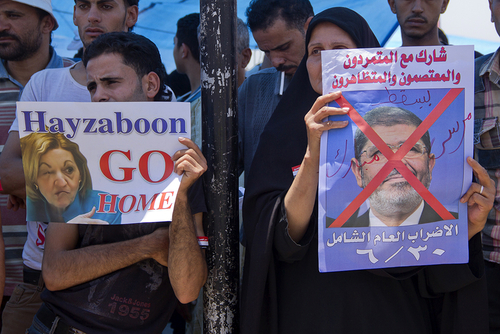|
Join Daniel Pipes in Cyprus in October 2013. For
more information, click here.
|
||||||||
|
Please take a moment to visit and log in at the subscriber area, and
submit your city & country location. We will use this information in
future to invite you to any events that we organize in your area.
Intricacies of Egypt's Coup d'état ExplainedWas Morsi the democratically elected president of Egypt? Every press account affirms he was but that is wrong. I co-authored three articles on this topic with Cynthia Farahat, looking at the first round of parliamentary elections ("Egypt's Sham Election"), the second round ("Don't Ignore Electoral Fraud in Egypt"), and the presidential elections ("Egypt's Real Ruler: Mohamed Tantawi"). In them, we documented the extensive manipulation of the 2011-12 elections, which we saw as "a ploy by the ruling military leadership to remain in power." I remain puzzled and frustrated why these elections, with their don't-pass-the-laugh-test results, continue to be portrayed as legitimately democratic. That they were not skewers the whole business about the military overthrowing a legitimate leader. Morsi was never in command: Obviously, he did not control the military, but he also did not control the police, the intelligence services, the judiciary, or even the Presidential Guard assigned to protect him. As one report from Cairo put it, "in a sign of how little Mr. Morsi ever managed to control the Mubarak bureaucracy he took over, the officers of the Presidential Guard … burst into celebration, waving flags from the roof of the palace." In other words, Morsi always sat in his office at the sufferance of the deep state, the very agencies that brokered his "election" in June 2012.
1952, 2011, 2013: The Egyptian military has now thrice in modern times overthrown existing leaders – a king, a former air force general, and a Muslim Brotherhood figure. No other institution in Egypt enjoys its power. In both 2011 and now, the street demonstrators congratulated themselves on deposing the president, but had the military sided with those presidents and not the demonstrators, the former would still be in office.
Ruling from behind the scenes: The 1½ years of direct military rule by Mohamed al-Tantawi and the Supreme Council of the Armed Forces (SCAF) from February 2011 to August 2012 went badly; this presumably explains why Gen. Abdul-Fattah al-Sisi immediately handed the government over to a civilian. Coups d'état have changed: On the evening of July 22, 1952, Col. Gamal Abdul Nasser told Anwar el-Sadat to come to Cairo from Sinai. But Sadat took in a movie with his family and nearly missed the overthrow of the monarchy. This anecdote points to two huge changes: First, the overthrows are now part of a national catharsis, as opposed to the obscure and furtive effort back then. Second, it's now the top military figures who remove the head of state and not hot-headed junior officers. Put differently, Egypt has entered the more sophisticated arena of the Turkish-style coup d'état, all four of which were carried out by heads of the military, not lesser officers. The military's fascism: Hillel Frisch notes that Sisi's reference to "the will of the people," when the people are clearly very divided, points to his and SCAF's inherently dictatorial vision. True, and there's nothing new here; military men have since 1952 ruled Egypt with this sort of anti-democratic pomposity. Analogy to Algeria: The Algerian army's intervened in the political process in 1992, just as Islamists there appeared to be on course to winning elections; this offers a comparison to the current situation in Egypt and raises the prospect of years of civil insurrection. But the analogy is not useful for Algeria experienced nothing like the mass opposition to Muslim Brotherhood rule in Egypt. It would be surprising if the Egyptian Islamists resorted to violence after their earlier experiences with this tactic and after seeing the vast numbers of their engaged opponents. Is Sisi in league with the Salafis? It was striking that Sisi invited Galal Morra as one of the select group attending his declaration that Morsi had been removed from office, and all the more striking so because Sisi's plan of action corresponds to the Salafis' own ideas. In particular, he neither appointed a leftist like Mohamed ElBaradei as interim head of government nor did he scrap the existing, Islamist constitution , but only suspended it. Adli Mansour a mere figurehead? That's what the smart money is saying. But they said the same about Anwar el-Sadat after Gamal Abdul Nasser's sudden death in 1970, only to be proven wrong. Mansour could well be transient but it's too soon to know, especially given his near anonymity. Anne W. Patterson, "hayzaboon": The U.S. ambassador to Egypt has been a disgrace, siding with the Muslim Brotherhood. Being the object of loathing on the streets of Cairo and called "old hag" has been her not undeserved reward for this betrayal of American principles.
Mr. Pipes (DanielPipes.org) is president of the Middle East Forum. © 2013 by Daniel Pipes. All rights reserved.
Related
Topics: Egypt
This text may be reposted or forwarded so long as it is
presented as an integral whole with complete and accurate information
provided about its author, date, place of publication, and original URL.
|
||||||||
|
To subscribe to this list, go to http://www.danielpipes.org/list_subscribe.php
Sign up for related (but non-duplicating)
e-mail services:
Middle East Forum (articles and event reports) Campus Watch (articles, blog posts) Islamist Watch (articles, blog posts) Legal Project (articles, blog posts) at http://www.danielpipes.org/list_subscribe.php |
Friday, July 5, 2013
#1266 Pipes on the "Intricacies of Egypt's Coup d'état Explained" in NRO
Subscribe to:
Post Comments (Atom)










































No comments:
Post a Comment